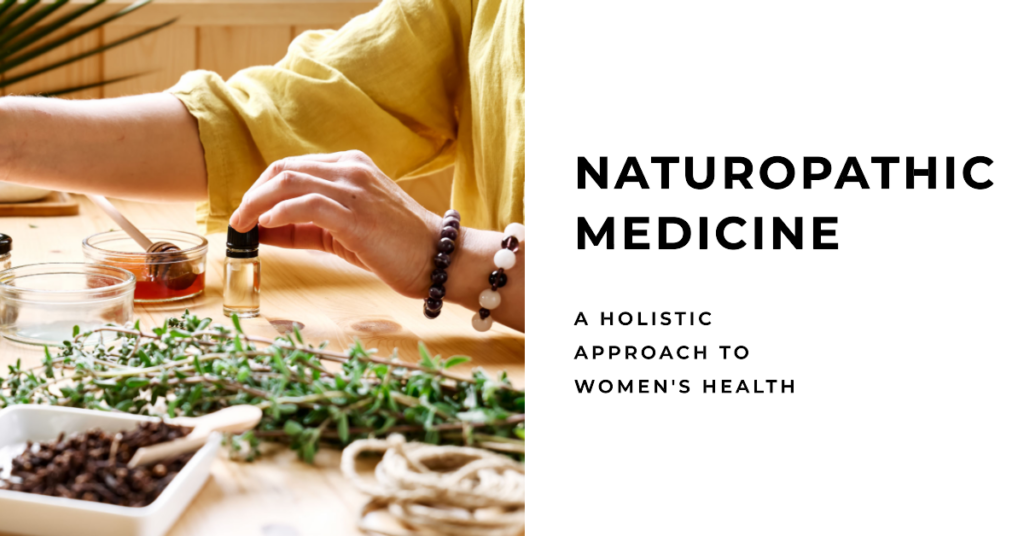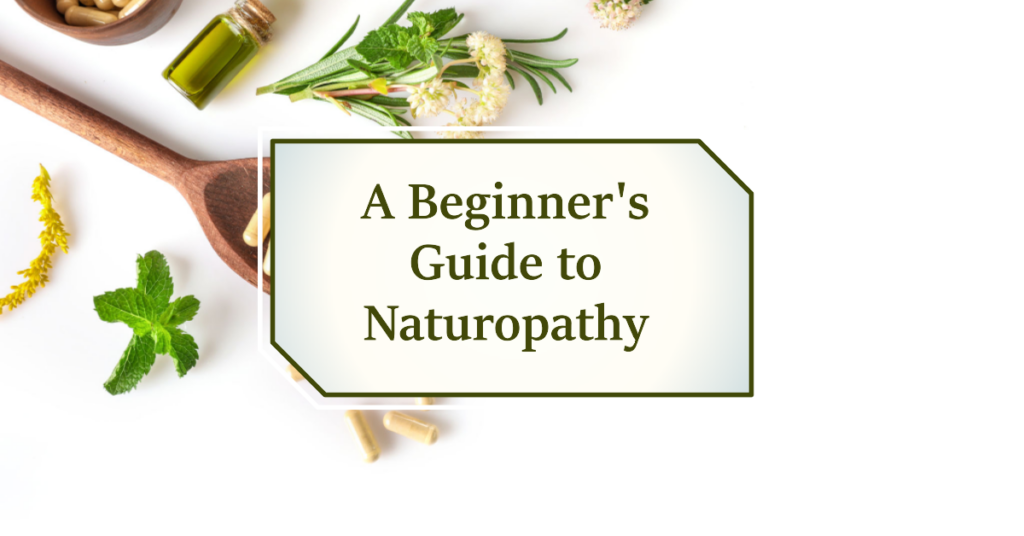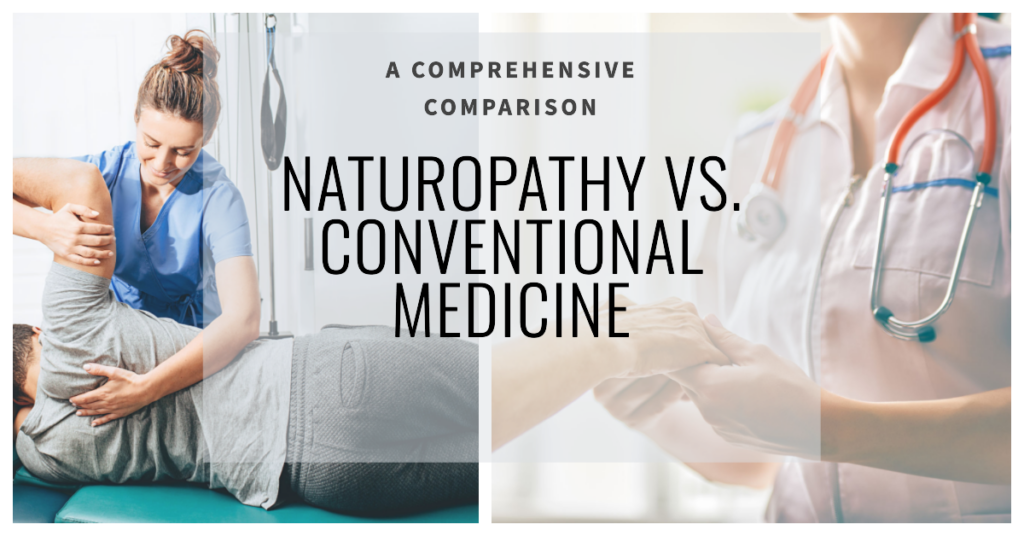Naturopathic Medicine: A Holistic Approach to Women’s Health

History and Core Principles of Naturopathy
Naturopathy, also known as naturopathic medicine, is a medical system that has its roots in the 19th century. It combines the scientific knowledge of Western medicine with traditional and natural forms of treatment.
The core principles of naturopathy, such as “First, do no harm” and “Treat the whole person,” emphasize the body’s inherent ability to heal itself when provided with the right environment and care. You can learn more about these principles in this article.
Naturopathic Approaches to Women’s Health
Naturopathic Doctor’s Role in Women’s Health
A naturopathic doctor plays a crucial role in women’s health. They focus on holistic, proactive prevention and comprehensive diagnosis and treatment. They combine the wisdom of nature with the rigors of modern science to aid the body’s self-healing process.
Naturopathy vs Conventional Medicine
When it comes to women’s health, naturopathic medicine takes a different approach compared to conventional medicine. While conventional medicine often focuses on treating symptoms, naturopathy aims to treat the underlying cause of an ailment. This comparison is further explored here.
The Women’s Health Naturopath in Toronto
In cities like Toronto, naturopathic doctors specializing in women’s health offer personalized treatment plans. They focus on conditions like menopause, hormonal imbalances, infertility, PMS, and PCOS. This holistic approach covers not just physical, but also emotional and mental health aspects.
Key Naturopathic Treatments for Women’s Health
Herbal Medicine and Traditional Chinese Medicine
Herbal medicine is an essential part of naturopathic treatment for women’s health. It involves the use of plants and their extracts to promote health and treat illness
Acupuncture and Nutrient Therapies
Acupuncture is another therapy that naturopathic doctors often use. It is a technique derived from Traditional Chinese Medicine, involving the insertion of very thin needles through the skin at strategic points on your body. Acupuncture can help balance energy flows, reduce stress, and alleviate various women’s health issues.
Nutrient therapies, on the other hand, involve using vitamins, minerals, and other nutritional substances to support health and treat illness. They can be particularly beneficial for women’s health, addressing issues such as hormonal imbalances, menstrual irregularities, and menopausal symptoms.
Diet and Lifestyle Changes
A naturopathic doctor considers diet a crucial part of a woman’s health strategy. They often provide dietary advice tailored to the individual’s needs, which may include guidelines on balanced nutrition, weight management, and detoxification strategies. These changes, combined with appropriate physical activity, can significantly enhance a woman’s health and wellbeing.
Hormonal Balance and Stress Reduction
The naturopathic approach to women’s health also involves addressing hormonal imbalances, which can contribute to various health issues like PMS, PCOS, infertility, and menopausal symptoms. Strategies such as diet, lifestyle modifications, and specific naturopathic treatments can help restore hormonal balance.
Stress reduction is another key aspect of naturopathy. High-stress levels can impact various aspects of women’s health, including hormonal balance, mental health, and cardiovascular health. Naturopathic doctors often recommend techniques like mindfulness, yoga, and other relaxation methods to help manage stress.
Naturopathic Medicine for Specific Women’s Health Issues
Menopause and Hormonal Changes
Menopause is a significant phase in a woman’s life, marked by hormonal changes that can cause symptoms like hot flashes, night sweats, and insomnia. Naturopathic menopause treatment focuses on managing these symptoms naturally and improving the woman’s overall quality of life.
Fertility Issues and PCOS
Naturopathic medicine also addresses fertility issues, including conditions like Polycystic Ovary Syndrome (PCOS). A naturopathic doctor can provide a comprehensive treatment plan that includes diet, lifestyle changes, and specific therapies to improve fertility and manage PCOS symptoms.
Mental Health: Anxiety and Depression
Naturopathic doctors understand the deep connection between physical health and mental wellbeing. They often use a holistic approach to treat mental health conditions like anxiety and depression, incorporating nutritional counseling, stress reduction techniques, and other natural therapies.
Chronic Conditions: Arthritis, Cancer, Diabetes, Heart Disease
Chronic conditions like arthritis, cancer, diabetes, and heart disease can significantly impact a woman’s health. Naturopathic medicine aims to complement conventional treatments for these conditions, focusing on symptom management, enhancing wellbeing, and improving the patient’s quality of life.
Table 1: Common Health Issues in Women Treated by Naturopathy
| Health Issue | Naturopathic Approach |
|---|---|
| Hormonal Imbalance | Herbal medicine, dietary changes, stress management |
| Menopause | Lifestyle modifications, acupuncture, herbal remedies |
| Infertility | Nutritional counseling, acupuncture, herbal treatments |
| PMS/PCOS | Dietary changes, herbal medicine, stress reduction techniques |
| Anxiety and Depression | Nutritional counseling, stress reduction, herbal medicine |
The Role of Prevention and Holistic Healing in Women’s Health
Prevention is a cornerstone of naturopathy. A naturopathic doctor’s primary goal is to prevent disease from occurring in the first place. This is achieved through education and strategies that promote a healthy lifestyle.
Holistic healing is another critical aspect of naturopathy. It considers the individual as a whole – including their physical, mental, emotional, and spiritual health. This approach ensures that all aspects of a woman’s health are addressed, providing a comprehensive healthcare solution.
Balancing Hormones Naturally: The Role of a Naturopathic Doctor in Women’s Health
Yes, naturopathic doctors can certainly help balance hormones. They utilize a wide range of techniques, including diet modifications, lifestyle changes, herbal medicine, and stress management strategies.
By assessing your individual needs and health condition, a naturopathic doctor can create a customized treatment plan to support hormonal balance. To understand more about hormonal balance and naturopathy, you can check this article on WebMD.
Naturopathic Approaches to Menopause: A Natural Path to Women’s Health During Transition
Absolutely. A naturopathic doctor can provide a range of strategies to manage menopause symptoms naturally. These include diet and lifestyle changes, herbal medicine, and acupuncture, among others.
They focus on improving the woman’s overall quality of life during this significant life transition. The North American Menopause Society provides more information on natural remedies for menopause symptoms.
Understanding Naturopathic Services: Can Naturopaths Perform Women’s Health Checks Like Pap Smears?
The scope of practice for naturopathic doctors varies by location and specific regulations. In some regions, naturopathic doctors are licensed to perform Pap smears as part of their women’s health services.
However, it’s always best to check with the local regulatory board or directly with the naturopathic practitioner. You can find more information on this from the American Association of Naturopathic Physicians.
Exploring Naturopathy: Three Key Methods Used in Women’s Health
Naturopathy encompasses a variety of treatment methods. Three common examples include:
- Herbal Medicine: Using plants or plant extracts to promote health and healing.
- Acupuncture: A traditional Chinese medicine technique that involves inserting thin needles into specific points on the body.
- Nutrition and Lifestyle Counseling: Providing advice on diet and lifestyle changes to promote health and prevent disease.
These practices are further explained on the National Center for Complementary and Integrative Health website.
Weighing the Pros and Cons: Potential Disadvantages of Naturopathy in Women’s Health
While naturopathy has numerous benefits, there are some considerations to keep in mind. For instance, some naturopathic treatments may not have undergone extensive scientific testing, and the effectiveness of certain therapies may vary between individuals.
Additionally, naturopathic treatments should complement, not replace, conventional medical treatments, especially in serious or life-threatening conditions. More about this can be found at Mayo Clinic’s Complementary and Alternative Medicine page.
Table 2: Comparing Naturopathic and Conventional Medicine
| Aspect | Naturopathic Medicine | Conventional Medicine |
|---|---|---|
| Focus | Treats the whole person (holistic approach) | Often focuses on the disease |
| Treatment | Uses natural and non-invasive therapies | Uses pharmaceuticals and surgery |
| Patient Involvement | Emphasizes patient education and self-care | Typically less emphasis on self-care |
| Prevention | Strong emphasis on disease prevention | Less emphasis on prevention, more on treatment |
Conclusion: Embracing Naturopathic Medicine for Women’s Health
Naturopathic medicine offers a unique and holistic approach to women’s health. Its emphasis on prevention, personalized treatment, and the use of natural therapies make it a compelling choice for women seeking comprehensive healthcare. Whether it’s
managing menopause symptoms, improving fertility, or addressing mental health issues, a naturopathic doctor can provide a range of strategies tailored to a woman’s individual needs.
As we embrace the future of healthcare, the role of naturopathic medicine becomes increasingly significant. For women, it offers an empowering pathway to better health and wellbeing, underpinned by a philosophy of care that respects and harnesses the body’s inherent healing capabilities.
If you’re interested in exploring more about naturopathy, the Scholistico website offers a wealth of resources, including articles, training courses, and more. Their Naturopathy Practitioner Training Course, which you can find here, is an excellent way to learn more about the practice. You may also find our beginner’s guide to naturopathy interesting.
FAQs
1. What is the role of a naturopathic doctor in women’s health?
A naturopathic doctor plays a crucial role in women’s health. They offer personalized treatment plans that address physical, emotional, and mental health aspects. They focus on prevention, comprehensive diagnosis, and treatment of various health conditions, including menopause, hormonal imbalances, infertility, PMS, and PCOS.
2. How does naturopathy differ from conventional medicine?
While conventional medicine often focuses on treating symptoms, naturopathy aims to treat the underlying cause of an ailment. It combines the scientific knowledge of Western medicine with traditional and natural forms of treatment.
3. Can naturopathic medicine help with menopause symptoms?
Yes, naturopathic menopause treatment focuses on managing symptoms naturally and improving the woman’s overall quality of life. It can help alleviate symptoms like hot flashes, night sweats, and insomnia.
4. How does naturopathy address mental health issues like anxiety and depression?
Naturopathic doctors use a holistic approach to treat mental health conditions like anxiety and depression. They incorporate nutritional counseling, stress reduction techniques, and other natural therapies.
5. Can naturopathy help with chronic conditions like arthritis, cancer, diabetes, and heart disease?
Yes, naturopathic medicine can complement conventional treatments for these conditions. It focuses on symptom management, enhancing wellbeing, and improving the patient’s quality of life.









Responses